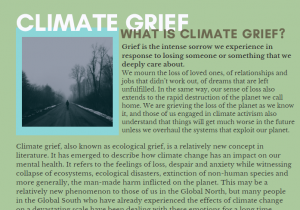What is Climate Grief?

Grief is the intense sorrow we experience in response to losing someone or something that we deeply care about. We mourn the loss of loved ones, of relationships and jobs that didn’t work out, of dreams that are left unfulfilled. In the same way, our sense of loss also extends to the rapid destruction of the planet we call home. We are grieving the loss of the planet as we know it, and those of us engaged in climate activism also understand that things will get much worse in the future unless we overhaul the systems that exploit our planet.
Climate grief, also known as ecological grief, is a relatively new concept in literature. It has emerged to describe how climate change has an impact on our mental health. Climate grief refers to the feelings of loss, despair and anxiety while witnessing collapse of ecosystems, ecological disasters, extinction of non-human species and more generally, the man-made harm inflicted on the planet. Climate grief is an important concept because it highlights our psychological response to a rapidly warming planet; after all, the climate crisis is not an abstract, scientific phenomenon – its effects can be physically felt. To grieve the loss of our home is a legitimate mental health response to the climate crisis, and constitutes an important part of what it means to be a human in the Anthropocene.
How do I recognise Climate Grief?
Not everyone experiences grief in the same way. For some, grief can come out as anger and rage, especially at the inaction of governments and corporations to reverse the scale of the crisis. In recent years, research has also been focussed on understanding ‘eco-anger’ and ‘climate rage.’ Others may feel a surge of ‘eco-anxiety’ or ‘climate anxiety’ at the thought of time running out to save our planet. After all, we are running out of time to minimise climate catastrophe, and we have less than a decade left. Climate grief can also cause sadness, frustration, denial and confusion. More often than not, you will have experienced some form of each of these emotions.
Climate grief can also be anticipatory or transitional – you may not experience climate grief immediately after a loss or ecological disaster. Instead, anticipatory grief is the process of grieving losses before they materialise. For instance, in the beginning of the coronavirus pandemic, some of you may have experienced anticipatory grief – the feeling that things are about to get much worse. Anticipatory grief can be hard to articulate because of the uncertainty associated with it: you do not know exactly when or how you will experience a tragic event. Similarly, the transitional nature of climate grief means that you grieve the loss of the planet as you live through these rapid, overwhelming transitions. The concept of ‘solastalgia’ may also be particularly helpful to explain this phenomenon. Solastagia refers to the lived experience of environmental change, and sparks feelings of emotional or existential distress. As Albrecht (the philosopher who coined the term) puts it, solastalgia is “the homesickness you have when you are still at home”.
Why is it important to acknowledge climate grief?
Climate grief is a difficult emotion to process, and it can often be a lonely experience. At times, you might even think it is easier to stay away from climate news, and suppress your emotions altogether (it really isn’t helpful to do the second, but do think seriously about how much news you consume, when you consume it and why). This might be a short-term solution, but in order to sustain climate activism over a period of time, neglecting your emotions can hurt your wellbeing, morale and ability to take climate action. You have to confront your grief, not just to look after yourself, but to be effective in taking action. Acknowledging grief becomes necessary to sustain individual and collective morale, and to deal with despair without giving into it. The next section addresses each of these elements in more detail.
References
(1) Cunsolo and Eliss (2018): “Hope and Mourning in the Anthropocene” See: https://theconversation.com/hope-and-mourning-in-the-anthropocene-understanding-ecological-grief-88630
(2) Watts, J (2018) ‘We have 12 years to limit climate change catastrophe, warns the UN’ The Guardian https://www.theguardian.com/environment/2018/oct/08/global-warming-must-not-exceed-15c-warns-landmark-un-report
(3) Albrecht, G. (2005). Solastalgia: a new concept in human health and identity. PAN Partners.
You can download this section of the handbook as a pdf. You can also download the whole handbook as a single file (32Mb).
We intend to do another edition, so if you’ve found something wrong with this page, or you have comments, you can either leave a comment below, or else email us on studentclimatehandbook@climateemergencymanchester.net
If you like this handbook, and you’re reading this before November 10th 2020, and you live, work or study within Manchester City Council’s boundaries, please sign the petition for a seventh scrutiny committee, then share the petition with seven of your friends…
Navigation
Student Climate Handbook home page
